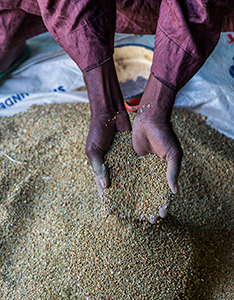WASAG WEBINAR – Compendium of drought resilient and nutritious crops under AWSAMe initiative
Date: Thursday, July 18, 2023, 15:00-16:30 (CEST)
Background

Water crisis is among the top five crises that will have the largest impact in the next decade. Exacerbated by climate change, growing scarcity and competition for water stand as major threats to future advances in food security, nutrition and poverty alleviation, with further impacts on the environment and human health, especially in rural areas. There are currently 2.3 billion people who live in water-stressed countries, of which more than 733 million people – approximately 10% of the global population – live in countries with high and critical water stress. Accounting for approximately 70% of global freshwater withdrawals, agriculture is expected to suffer the greatest impact of water scarcity.
Building on the ongoing FAO initiatives, namely the Global Framework on Water Scarcity in Agriculture (WASAG) and country/regional water scarcity initiatives, lessons learned and successful experiences, and in response to requests of Member countries in the Near East, Africa, Asia/Pacific and Latin America, the AWSAMe – “Addressing Water Scarcity for Agriculture and environment” – initiative is one Value Adding Impact Area Initiative (VAIA) supporting one of the four Betters of the FAO Strategic Framework for 2022-2031, namely ‘Better Environment'. AWSAMe will scale-up actions aimed at:
• promoting enhanced investment, policies, governance and best practices to sustainably increase water productivity;
• providing tools for strategic planning of optimal and sustainable allocation of scarce water resources; and
• implementing strategies for a water-reform agenda and supporting access to financial resources and investment.
As a first step, AWSAMe seeks to promote the wider adoption of drought resilient and nutritious crops and to this end, it is collaborating with CIRAD (Centre de Coopération Internationale en Recherche Agronomique pour le Développement) to identity such crops, consult with interested countries and develop with interested countries project proposals..
This webinar presents the first results of the litterature review carried out by CIRAD towards a compendium of drought resilient and nutritious crops contributing to improved biodiversity, focusing on crops that are adaptable to dry conditions and have a high nutritional value, as well as neglected and under-utilized crops. The different crop groups identified include cereals; fruits; pulse; leafy vegetable; roots/tubers; seeds and nuts; stimulant; vegetable and blanks.
Synergies with the Vision for Adapted Crops and Soils (VACS), which focuses on Africa and with the One Country One Product (OCOP) initiative will be discussed.
Taking advantage of the International Year of Millets (IYWM), the webinar will also feature cases of millets.
Objective
i. Present and explain a database of drought-resistant and nutritious crops in view of dealing with water scarcity in agriculture and the environment
ii. Highlight synergies for collaboration with the Vision for Adapted Crops and Soils (VACS) and the One Country One Product (OCOP)
iii. Illustrate the relevance of the initiative by featuring the millets in the context of the IYM.
iv. Receive feedback from participants in view of the consultations with interested countries
Watch the recording of the webinar:
Agenda
15:00-15:05 – Welcome by Moderator – Ruhiza Jean Boroto, NSL, FAO
15:05-15:10 – Opening remarks: Why AWSAMe – Lifeng Li, Director, NSL, FAO
15:10-15:25 – Methodology, findings of promising crops and study limits – Amélie Audouit, CIRAD
15:25-15:35 – Example of crops (millets) and its distribution – Jordan Essombe, NSL, FAO
15:35-15:45 – Synergies between AWSAMe (Global) and Vision for Adapted Crops and Soils (VACS) (Local: Africa) – Michel Ghanem, CIRAD
15:45-15:55 – Synergies with the One Country One Product (OCOP) – Hafiz Muminjanov, NSP, FAO
15:55-16:25 – Discussion – Moderator – NdeyeNdack Diop, SFC, FAO
16:25-16:30 – Next steps and closing : consultations with countries – Moderator
